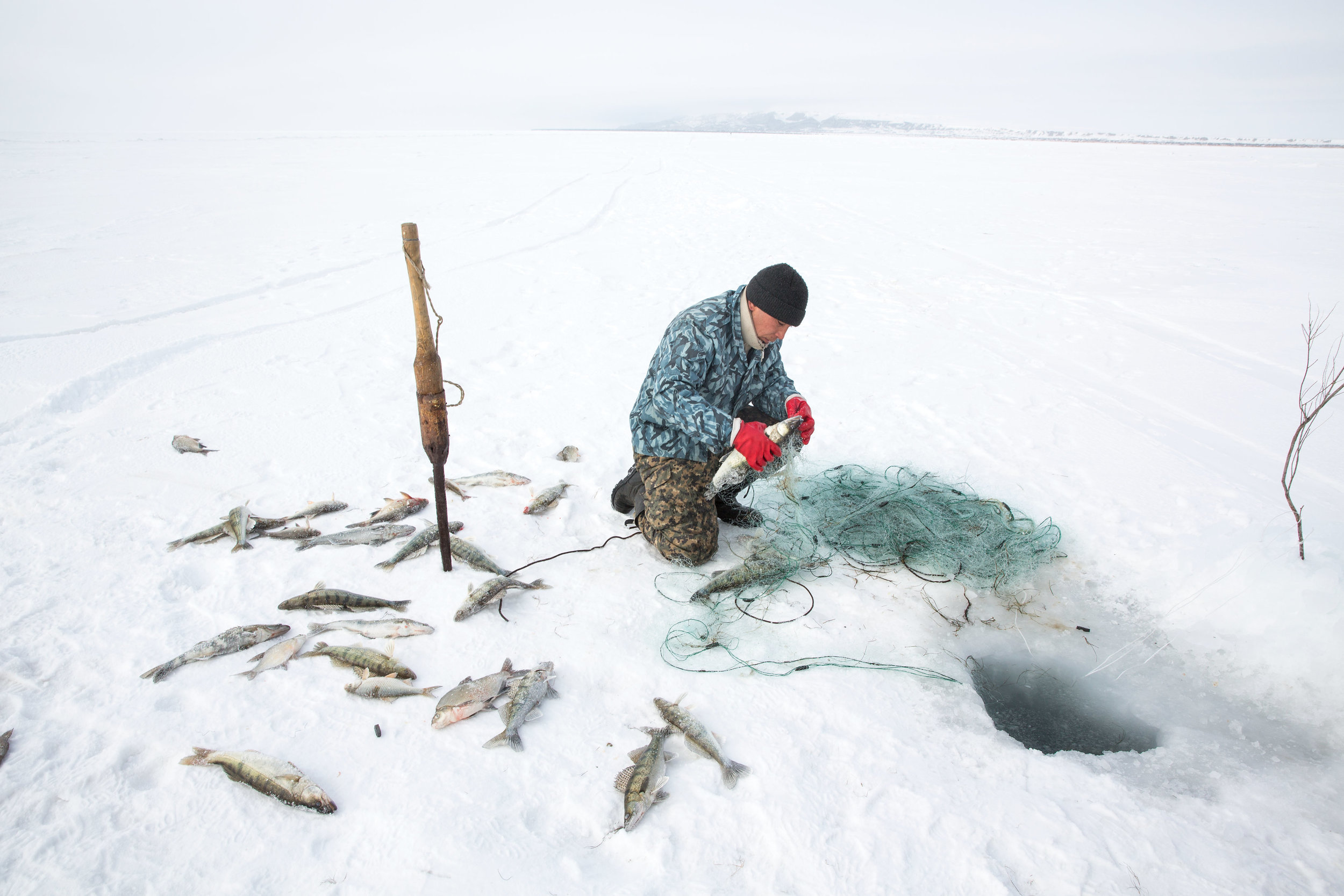Last month, Taylor and I took a 30 hour train ride from Almaty to Aralsk. We had just spent about a week in Astana and Almaty, working on stories about the economy and Kazakhstan's growth as a tech/financial/fashion hub in Central Asia.
Taylor is very pleased with our train accommodations. (Credit: Dene-Hern Chen)
So to get to Aralsk, bleary-eyed at 6:30 AM, meant switching gears mentally to start reporting on a story about the return of the North Aral Sea and its impact on the surrounding fishing villages. It was kind of jarring to go from the hyper-modern cities of Astana, with its neo-futuristic buildings, and Almaty – to Kyzylorda region, where all we saw for *hours* was snow when driving from Aralsk (the main city) to Tastubek, a fishing village. So much snow for miles and miles.
I felt like I was in a horror movie...
We didn't have a lot of time in Aralsk and Tastubek – a fishing village that is about an hour from the water – and we were worried about several different things. Taylor, being the visuals person, was most worried about not being able to actually go ice-fishing with the families since temperatures in Aralsk had been steadily rising that week. Luckily, when we arrived, it was a (balmy) -18 degrees Celsius, and it only went up slightly throughout the day. We were also able to find a family in Tastubek that was willing to go out fishing in the frozen Aral Sea, despite rumors of fish inspectors patrolling the area.
Omirserik, 25, works to free the fish from the net. (Credit: Taylor Weidman)
For me, I was worried about how open the families would be to talking about the bleaker years, when the sea receded and the fish died due to the high salinity of the water. In my experience of reporting on environmental-connected-to-economic disaster, it can be very painful for families to open up about it. Part of it is shame over their past misfortune; people feel a lot of pain over uncontrollable nature-related events.
For example, when Taylor and I were in northern Mongolia last year speaking to families in Khovsghol province about the dzud, a winter phenomenon that leaves tens of thousands of livestock throughout the country dead from starvation, that was a real challenge as many families were still enduring a long winter. I remember one particular family where the husband, Batsuri Sharkhuu, was very open about the loss of sheep and goats, but his wife grew increasingly angered during the interview. Later, he said to us, "My wife has gotten more aggressive recently because all the animals keep dying. It’s like watching all our property gone in one day. How would you feel if that happened to you?"
I've been doing this a couple years now, so when people accuse me – and other journalists – of sadness porn, I can often revert to the usual reasons of why our work is so necessary. And I absolutely believe in these reasons. But I also still feel a twinge in my chest whenever I know that someone's sadness or terrible life-altering situation translates to a more... effective story for publication.
Luckily for us, we were actually in Aralsk and Tastubek to report on a happy story (seriously, how rare is that for a journalist??). Because the region has been experiencing an increase of water and fish catch in the North Aral Sea since a World Bank-financed dam was built in 2005, the residents were glad to talk about the leaner years – it made their turn in fortune so much more like a blessing. In the end, Taylor and I had a very productive time there, and we were even able to inject some nuance into the story. You can read it here.
Pike-perch (Credit: Taylor Weidman)
We were also lucky to try some fish from the Aral Sea! We ate the pike-perch, which is the fishermen's favorite catch as it is the most expensive, and the flounder, which the fishermen kind of hate because it's ugly and it reminds them of the years when it was the only species able to survive the high salinity of the North Aral Sea.








